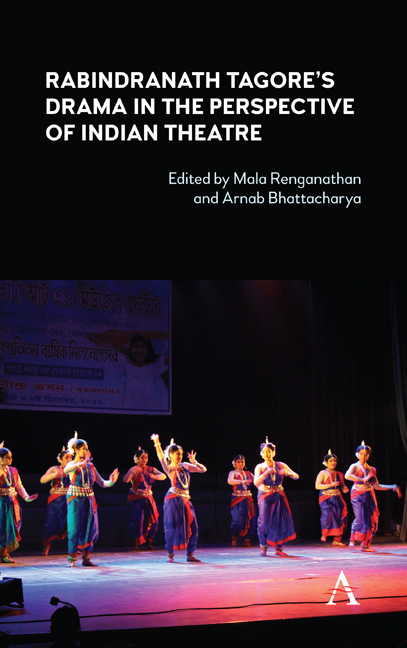Chapter 1 - Rabindranath Tagore: Imagining Nation, Imagining Theatre
Published online by Cambridge University Press: 20 January 2022
Summary
On 1 January 1877, the title of ‘Empress of India’ was conferred upon Queen Victoria. To mark the occasion, Sourindra Mohun Tagore (1840–1914) composed a song in her honour, hailing her as ‘rajrajeshwari’ (empress). A month later, the not-yet-sixteen Rabindranath sounded a defiantly different note in a poem, ‘Dillir Darbar’, that he read at the Hindu Mela:
British bijay kariya ghosona
Ar je gay gak, amra gabo na,
Amra gabo na harasa gaan
Eso go amra je kajan achi
Amra dharibo arek tan.
[Whoever else sings the glory of the British, we shall not do so,
Come, let us few who remain, sing a different tune.]
And, in response to Eleanor Rathbone's insensitive statements made in an open letter (28 May 1941), on 4 June 1941, just a couple of months before his death, Rabindranath had this to say:
It is not so much because the British are foreigners that they are unwelcome to us […] as because while pretending to be trustees of our welfare they have betrayed the great trust and have sacrificed the happiness of millions in India to bloat the pockets of a few capitalists at home. I should have thought that the decent Britisher would at least keep silent at these wrongs and be grateful to us for our inaction, but that he should add insult to injury and pour salt over our wounds, passes all bounds of decency.
Between the teenager and the octogenarian, came various phases of Rabindranath's ideological engagement with the notion of the ‘nation’, which need to be historicized in relation to events, both at home and abroad, to which he was a witness and which left their own impressions upon him. There was his early emphasis on the indigenous society (Swadeshi Samaj) – which, according to some recent Western theorists of nation and nationalism, would point towards an ‘organicist’ view of nation as an ancestrally based sociocultural community, or, according to others, might correspond to the idea of the Gemeinschaft (emotional community). Against this could be posited the notion of the ‘nation state’, which, for some theorists, is a product of ‘modernization’, with the political community as its constituent, while, for others, would be equivalent to Gesellschaft (rational/ political community or state).
- Type
- Chapter
- Information
- Publisher: Anthem PressPrint publication year: 2020



